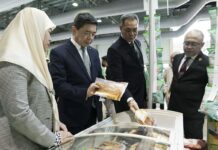The government has banned residents from leaving their homes from 8pm to 4am from October 4 to 17 in the newest, most stringent COVID-19 restrictions implemented since the second wave of cases.
Dubbed operasi pulih (recovery operation), the new measures will only allow residents to leave home during the restricted time period for essential work or emergencies.
Since the second local outbreak of COVID-19 on August 7, Brunei has not been able to slow down transmission rates.
With 210 cases reported yesterday and a new high of 2,233 active cases in total, bed capacity at isolation and treatment centers is now at 78% capacity, necessitating enhanced movement restrictions, said Second Minister of Finance and Economy and Minister and the Prime Minister’s Office YB Dato Dr Hj Mohd Amin Liew Abdullah at the COVID-19 press conference yesterday.
Grassroot leaders including village heads are expected to work in tandem with enforcement agencies to conduct surveillance during the new restricted period.
Brunei has restricted movement since August 9 by introducing guidelines that limited leaving home for essential work and in pairs for daily necessities, visiting parents or outdoor exercise.
However, many new clusters have emerged from gatherings at residences recently, indicating that segments of the public are continuing to flout gathering guidelines.
“A few weeks ago we actually predict the number to start to come down but it hasn’t and this is because people are still moving around, visiting friends, having parties and so on,” said the minister. “This is causing the (outbreak) curve to continue to stay high. So what we need to do is to address this differently.”
The public is advised to report anyone contravening regulations to the hotlines manned by the National Coordination Centre for COVID-19: 8176148, 8175148, 8166148 and 8155148.
The government is expected to provide additional clarification today on how businesses will operate during the restricted time period.
Accelerating towards 80% vaccination for de-escalation
The government’s own supply arrangements for vaccines – which include 300,000 Pfizer doses scheduled to arrived this year – have been supplemented by contribution from foreign governments amounting to 552,000 doses.
With supply available for administering, the minister said the government has revised its target to fully vaccinate 80% of the population from March next year to December this year.
As vaccinated populations are less likely to have severe symptoms, higher vaccination rates will reduce hospitalisation rates and enable the government to ease restrictions again.
Citing the efficacy of vaccines, the minister pointed out that there have been no coronavirus patients in intensive care who had received the vaccine.
“The strategy for the government is to vaccinate as many people as possible to reach this target… unlike a couple of weeks ago we were having problems with vaccine supply. Now we have the vaccines, so we can make a difference now,” said the minister. “We have the tools to make it a game changer.
“Once we get through this critical time we will be able to start seeing the number start to come down that’s when we can start looking at how we can de-escalate. But of course this is still some time away.”
As of September 27, 40.4% have been fully vaccinated, with 62% receiving at least one vaccine dose. 75% of COVID-19 cases reported since the second wave were not vaccinated; 17% had received a single dose while 8% have received two doses.












